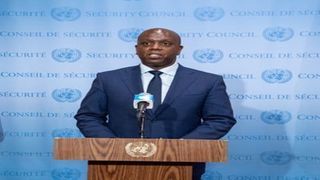
Dr Martin Kimani, Kenya’s Permanent Representative to the United Nations.
| CourtesyAfrica
Premium
Sudan coup: Kenya frustrated at lack of consensus in UN Security Council
Kenya says the lack of consensus in the UN Security Council signals that the global body is not working well with regional blocs to resolve crises.
On Wednesday, Kenya’s permanent representative to the UN, Martin Kimani, said the Council had struggled to find a common position on the situation in Sudan, where the military took power on Monday and dissolved the transitional government of Prime Minister Abdalla Hamdok.
The African Union Peace and Security Council has since suspended Sudan from its activities until Khartoum reconstitutes a transitional government of civilians. But the UN Security Council could not agree on a joint statement even after meeting on Wednesday night behind closed doors.
“The inability of the Security Council to make a statement so far is an indication that the way [it] and the African Union Peace and Security Council work together could be made better and stronger,” Dr Kimani told the media on Wednesday night.
“I very much hope that the UN Security Council could consider this step by the AU Peace and Security Council to be a challenge to step up.”
He spoke as President Uhuru Kenyatta prepared on Thursday evening to lead a debate by video link on the cooperation between the UN and regional and sub-regional organisations such as the African Union and the Intergovernmental Authority on Development.
The debate was expected to focus on the complementarity principle and the financing of regional blocs to deal with local crises.
Shortly after the coup in Sudan, UNSC members including the UK, known as the penholder for Sudan at the Council, requested closed consultations.
France and Norway supported the meeting, as did Kenya, Niger, Tunisia and the Caribbean representative St Vincent and the Grenadines, often known as A3+1.
Ahead of the session, Dr Kimani had told journalists a common statement is “something our delegation is going to negotiate and push.”
But members of the Council did not agree on drafts submitted by those who called for the meeting that was also addressed by the head of the UN Integrated Transition Mission in Sudan, Volker Perthes.
Sudan, meanwhile, announced more radical purges of its government after the military junta sacked the country’s ambassadors to the US, China, France, the European Union, the UN in Geneva and Qatar.
They were removed for reportedly defying the junta and rejecting the coup, according to a statement issued on Wednesday. But these are also key countries and regions that have been heavily invested in the country’s transition project.
Kenya, the October president of the Council, said it endorsed the AU’s statement on Sudan, which rejected the coup, called for the release of all civilian leaders and demanded that a transitional government be re-established and run by civilians.
“The AUPSC reaffirms the imperative of a civilian-led and consensual transition in Sudan, in line with the Constitutional Declaration and Juba Peace Agreement, as well as the aspirations of the people of Sudan,” said a communique from the AU Peace and Security Council on Wednesday.
The Council said the Sudanese military, led by coup leader Abdel Fattah al-Burhan “will be held responsible for the personal health, safety and security of the detained officials”.
Although the AUPSC submitted its resolutions to the UN Security Council, the political rivalry of its membership could derail the drafting of a joint statement.
As it is, members are undergoing what is called ‘silence’, which means several days given to members to respond to drafts proposed by supporters of the meeting. If a member doesn’t give a response to a draft, it is deemed to be a no objection.
Meanwhile, proponents of a tougher stance on Sudan, such as the US. have gone on to suspend aid to Khartoum until a proper civilian transitional government is re-established.
Last evening, the UN Security Council issued a statement expressing “serious concerns” about the military takeover and asking that all detained civilian leaders be released. The statement did not call the power grab a coup.
“The members of the UN Security Council called on Sudan’s military authorities to restore a civilian-led transitional government on the basis of the Constitutional Document and other foundational documents of transition,” it said.
“They urged stakeholders to engage in dialogue without pre-conditions in order to enable full implementation of the Constitutional Document as well as the Juba Peace Agreement, which underpin Sudan’s democratic transition.”





